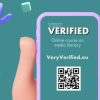Youth Toolkit
The Youth Toolkit of the non-profit Center for Humane Technology (CHT) is a free digital skills resource that looks at how we use social media to explain how it works in practice.
Inspired by the idea that everyone who uses social media deserves to know how it works, the Youth Toolkit is an interactive roadmap that offers a possibility for people to explore our social media environment in a more comprehensive way.
A roadmap to social media
The resource is structured in the form of different guides, which are interactive and easy to work with. They can be used individually, or worked on by groups and teams. The roadmap can also be used in classroom settings, or through online lessons.
Each guide is useful on its own and tackles a specific topic. At the same time, the guides work best when used as a full curriculum. They are designed for educators to use with young people between the ages of 13 to 25 but can be used by anyone to learn about these issues and to push for a humane, sustainable, and equitable future.
Topics and guides
Grouped in an interactive map with different colours depending on theme, level and focus, the resources look at the technology and information environment to offer some guidance on how we use social media, and how it functions. The first 5 guides are grouped together and look at the pervasive power of social media: why it is so addictive, how does it grab our attention - and what is the price of our attention.
Check out the first guide, Attention Economy to see the main economic factors that drive tech companies to sell your attention and behaviour, and discover how social media companies make money. With the second guide, Persuasive technology, you can dive into the different ways in which technology actually impacts us, and in turn, changes our behaviour. Social media and the brain explores the science behind social media, and how it keeps us hooked. To wrap the first set of guides, check the final one: Seeing the consequences to dig deeper into the problems technology has created, and how it distorts our view of the world,
Digital skills resource details
Each guide contains questions and activities that can be self-directed or worked through in a group or classroom setting. Each guide can be useful on its own, though they are best when used as a full curriculum.





